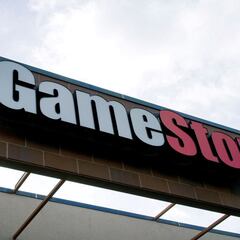Why have some brokers restricted GameStop trading?
Controversial financial news this week has brought into question the very freedom of the free market. What’s the latest on the Reddit GameStop scandal?

It all started with a subreddit called WallStreetBets on the chat site Reddit. Quite literally against all odds - in what became a micro class war - a group of keyboard warriors decided to bet big against gigantic financial institutions and temporarily change the fortune of a video game retailer on the downturn called GameStop.
The amateur traders, whose subreddit bio is “Like 4chan found a Bloomberg Terminal” and led by user “DeepFuckingValue” organised themselves to gradually buy up shares in the retailer, forcing the price of GameStop’s stock into the heavens, simultaneously making a lot of money for themselves and crushing the strategy of the colossal hedge funds who’d bet against it.
And it worked.
GameStop’s stock price jumped from $4 last summer to $20 at the end of 2020, to $40 two weeks ago. It was worth $100-ish at times on Monday and Tuesday and at its peak on Wednesday reached over $450.
Tuesday night following market closure Tesla CEO and richest man in the world Elon Musk tweeted out Tuesday evening to his 43.1 million followers one simple word: “Gamestonk!!” which was enough to further rally the Reddit trolls and boosted share prices yet again. Musk has taken personally against short selling as a practice in the past.
Gamestonk!! https://t.co/RZtkDzAewJ
— Elon Musk (@elonmusk) January 26, 2021
Robinhood and other brokers restrict trading in GameStop
Amateur traders on the stock market like the now-famous Reddit traders, are enabled by commission-free trading apps, making it possible for "normal people" to buy and sell stocks as they please. In essence this democratised the whole system. Until Thursday.
Several brokers, took matters into their own hands, including Robinhood, Ameritrade and Charles Schwab. They restricted trading of GameStop as well as a handful of other stocks on their platforms.
The brokers claimed they had to do this to reduce their risk; they are required by the Securities and Exchange Commission to have enough cash on hand to cover a certain percentage of trades on their platform. When stock volatility is high, it drives up how much capital they need.
Of course following the restrictions, the game was over and GameStop stocks plummeted. But Reddit traders who were smart enough to get out while the going was good – at the peak a share in GameStock was over 100 times August’s value – will have made a life-changing amount of money.
The move sparked allegations that the hedge funds had wielded influence over Robinhood and other trading platforms to stop the upward rally. Robinhood's ethos, as expressed in a tweet from 2016 has been brought into question. "Let the people trade," the company stated.
Let the people trade.
— Robinhood (@RobinhoodApp) March 23, 2016
The fallout even sent allegiances in Congress rather topsy-turvy when Republican and democracy-denier Ted Cruz agreed with socialist - Democrat Alexandria Ocasio-Cortez both calling for a hearing into the decision to halt the trades.
Fully agree. 👇 https://t.co/rW38zfLYGh
— Ted Cruz (@tedcruz) January 28, 2021
Side note - Ocasio-Cortez quickly rejected Cruz's support, citing his denial of Joe Biden's election victory and his part in feeding the poisonous rhetoric that incited a deadly insurrection at he Capitol building on 6 January.
I am happy to work with Republicans on this issue where there’s common ground, but you almost had me murdered 3 weeks ago so you can sit this one out.
— Alexandria Ocasio-Cortez (@AOC) January 28, 2021
Happy to work w/ almost any other GOP that aren’t trying to get me killed.
In the meantime if you want to help, you can resign. https://t.co/4mVREbaqqm
Why was GameStop picked for the play?
So what made the members of subreddit WallStreetBets choose to toy with GameStop in particular?
The 37-year-old retailer is actually the largest physical video game retailer in the US, hardly a classic underdog. However this accolade holds significantly less weight than it did in the 1990’s and the company had a bleak outlook with the coronavirus pandemic forcing them to close stores; increased competition and consumers increasingly using online stores to purchase the latest games.
It operates 5,509 retail stores throughout the US, Canada, Australia, New Zealand and Europe and trades as NYSE:GMO in the S&P 600 index.
The stock was seen as so unlikely to succeed that it became one of the most 'shorted' on the market, meaning that investors and hedge fund managers were betting that the price would fall.
What is short selling?
In short… it’s the practice of betting against the success of the company - that its stocks will go down in price. A vote of no confidence, in other words.
When someone ‘short sells’ a stock, they borrow and sell on shares of a stock that they do not own, based on the assumption that it will be worth less in the future and when all goes well, they close their deal by buying more stock for less money, giving back the stock to the owner and pocketing the difference.
If the bet is misjudged and the stock ends up increasing in price instead of decreasing, the trader is “exposed” and has to pay the difference. This phenomenon, where the trader is forced to sell the stock for a higher price instead of a lower one is called a "short squeeze". And if the price keeps going up, well, the loss just grows and grows.
Short selling is one of the most risky practices in trading, but can be one of the most lucrative.
When big hedge funds short sell a company by millions of dollars they effectively push the price of the stock down, spreading a negative perception of the stock.
What happened to GameStop was part of a wider trend of investment in ‘meme' stocks, which refers to companies who are seen as so outdated that they have become the subject of greater interest amongst online communities. There have also been notable price increases for stock of Nokia, Best Buy, Blackberry and AMC Entertainment, all of which were heavily shorted by Wall Street investors.
Which hedge funds lost out?
Related stories
The Wall Street investors who had shorted stocks of GameStop were relying on the price falling so they could get their money out but a huge surge in investment has seen the price skyrocket and left them unable to close their positions.
Two big hedge funds, Melvin Capital and Citron Research, are thought to be the most exposed. The former is believed to have lost around 30% of its $12.5 billion under management already this year on a series of shorts, which includes GameStop.


